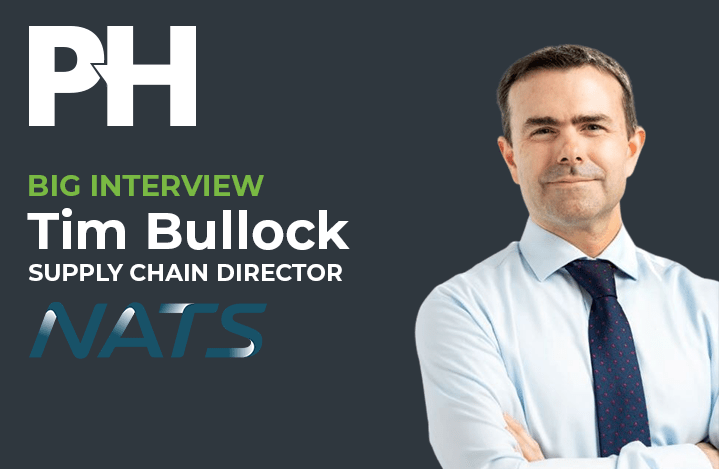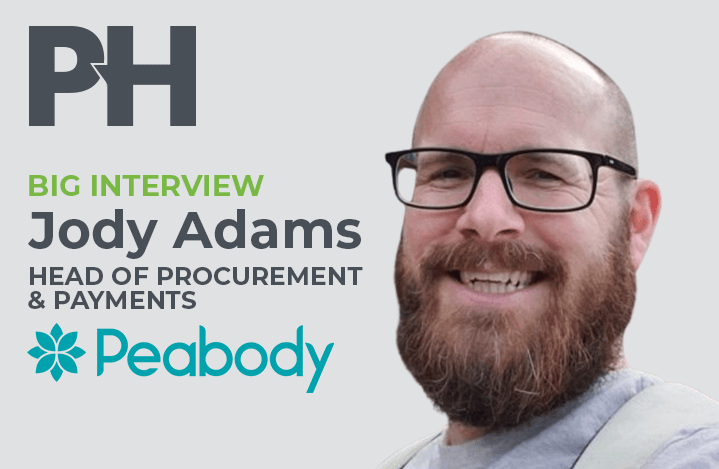Procurement Heads‘ May edition features Tim Bullock, Supply Chain Director at NATS.
How did you get into Procurement?
I suspect I’m one of the unusual people that actually wanted to get into Procurement from the outset! I applied for a graduate scheme role with the Mobil Oil Company, and I got it!
It was the autumn term of my final year of university, and I’d been sitting back merrily as all my friends desperately tried to get roles – but then, just before Easter of that year, I got a letter…
It was the year Mobil merged their downstream activities with Exxon and they later basically said, “terribly sorry Mr Bullock, but the graduate scheme has been cancelled!” And with that, my role in Procurement was no more.
I then went off and joined the bus and train company Stage Coach for a brief foray into public transport, and eventually got the opportunity later in Sainsbury’s to start procuring transport activities – and I fell back into Procurement by virtue of the transport route. The rest, as they say, is history!
What does your typical day now look like?
There simply is no such thing as a typical day, and that’s probably one of the things I love most about Procurement.
The majority of my time is largely spent on some form of relationship management, whether that be with internal or external stakeholders, or working on setting the right environment for the rest of the team to be successful.
An awful lot of my role nowadays is conversational, focused on relationship and network building. I also spend quite a lot of time travelling – a significant amount of the supply chain we’ve built is European-based and some are US-based.
As good as technology or tools are – if you’re driving a relationship-based Procurement strategy you do need to spend time with people, so that’s why I travel.
Have the last 6-12 months given you a lot of challenges with regard to Brexit, and having a European supply chain?
Like many businesses, having a lack of clarity on what the future looks like means that you are planning for multiple scenarios.
The reality is, NATS as a business is highly dependent on European connections which means that regardless of any political outcome or any future trade rules, we will need to continue tight collaboration and cooperation with our European suppliers and European neighbours operationally.
We have to operate in an environment where we need something that stands up regardless of the political settlement – that’s been a real focus of ours lately.
What do you love about Procurement?
I have two answers for this, and the first is variety. I am naturally a highly inquisitive person, so I like to understand how and why things work.
Procurement for me is one of the areas that touch virtually every other part of the business (if done properly!) but also has a lot of external interfaces as well.
The variety that brings, and the knowledge and broad remit, is hugely exciting and one of the things that really gets me out of bed in the mornings.
The second is collaboration – making those all-important connections and linking how everything fits together from the procurement function out.
It gets really exciting for me when I can see those connections and when others can see them as well – that’s when the real value is unlocked.
Bringing together different parts of the business that would otherwise not be talking to each other is key and here at NATS, we act as a facilitator, which is hugely rewarding! It’s actually one of the things we’ve been very successful in doing at NATS – looking at how we create a supply chain for the whole of NATS as opposed to just a change program for the Supply Chain team.
We have recognised that everybody in NATS is dependent in some shape or form on the Supply Chain so it’s more important than ever to make those links throughout the business.
Would you say that NATS recognised the need to do that before you joined, or has that been an evolution you have led?
I was very lucky because at the time I joined, our CEO and my immediate boss, the MD, had actually been a supplier to NATS so they were enlightened as to what NATS was like as a customer to deal with, including where some of the challenges were – so when I was able to position what I wanted to do, I had a very receptive audience.
I’ll talk about sponsorship later on – but as a Procurement function, sponsorship from senior seats within the business is absolutely key.
One of the things we had to do in the early days made it really clear that we weren’t going in to tell people how to do their job; we were volunteering to join part of their team – and we would do that in a timely manner.
If you try and wade in with some immediate transformation programme that over-promises in the early days, you can drive a wedge between the Procurement function and the rest of the business which is hugely detrimental.
What you really need to do is move with them, influence and change from within. When you plan it over a reasonable and sustained period of time, you’re able to do that.
If you could give your younger self some advice, what would it be?
Hurry slowly. It’s important to be as rounded as you possibly can be before you step up into Leadership positions.
Taking the opportunity to spend time in a variety of different categories and business scenarios, gaining multiple experiences, will mean that you not only learn the technical skills but you also learn the personal skills – and that’s what differentiates people.
Have you observed any trends within Procurement recently?
There are two things that I have noticed – one of which we are very active in, and one which is probably more futuristic.
Technical skills are valuable, yes, but they will not differentiate you either as an organisation or as a team.
How you drive a relationship management strategy across your business and supply base and get those rounded skills into people as early as possible – that’s what is going to make a big difference in the future. We are investing a lot of time in high-performance programmes at the moment, focusing on the softer skills and training on impact and influence – even formal training like negotiation skills training heavily emphasises all of the emotional interplays.
This is a very important trend, and I truly believe we are already significantly more advanced in adopting that trend than a lot of other businesses.
The other trend that many businesses are beginning to do a lot of work on is extended risk management and due diligence.
The interconnectivity of our supply chains at the second and third tier means that shocks can occur three tiers down and can affect you as an end customer, whether that be a cyber incident or a CSR-related incident – and we need much more visibility in those areas than we have today, in many industries.
I think that’s a Procurement and Supply Chain trend that’s definitely here to stay, and most businesses are working hard to try and fill some of those gaps.
You mentioned earlier the importance of sponsorship from senior leaders in the business, can you elaborate on that or tell us about how you achieved it?
There’s no single answer to achieving sponsorship. It’s one of those situations where, to an extent, you will only recognise it when you’ve got it!
It’s the moment you’re invited to become a core member of someone else’s leadership team, or when members of your executive team ask you to move the dates of supplier performance reviews and partnership reviews because they are so determined that they want to be there. Instead of fighting to get some time in people’s diaries, you’ll suddenly realise it is them who are insistent that they are in your diary. That’s when you’ll know you’ve got sponsorship.
There isn’t a magical textbook you can follow to get there, it’s something you have to find and create on your own! Interpersonal trust is always the key to it – like being a valuable part of someone’s team and not plugging your own agenda, or making sure your strategy responds to the business needs and isn’t just a piece of academic purity in its own right.
For example, we apply category management broadly within our strategy – but it’s not category management as you’d expect to see it because it has been heavily tailored to work within this business environment, using a language that everyone within this business understands. When you work in this way, you’ll get people’s buy-in and that’s where sponsorship comes from. It’s a long hard journey which unfortunately involves a lot of individual trust, but that’s where you want to be at the end.
Who had the most influence over your Procurement career?
I would say it was a chap called Tony Douglas. When I knew him he was the Supply Chain Director at BAA; he offered me a ‘proper’ Procurement job when I joined that business. He was actively looking for people with different skill sets and backgrounds to bring into the business. He always said: if you have a good sense of business you can always be taught Procurement.
That’s a mantra that I’ve followed throughout my career because of him, and it’s true – people from broad backgrounds can have the technical skills overlaid but what you can’t do is re-engineer somebody who doesn’t have, for example, the interpersonal skills.
What do you like to do with your spare time, do you try and achieve work/life balance?
Spare time, what’s that? In all seriousness, I think it is really important to have a good work-life balance.
Within our Procurement function, we’ve deliberately created a pretty healthy approach to flexible working. If you are more flexible as an organisation, people will generally give back a lot more so ultimately both the business and the individuals will benefit.
For me – I have a house in France that I love going to (although I don’t get there as often as I would like!) but I really enjoy it when I do. When I’m in the UK I enjoy mountain biking and road cycling – but one of my biggest enjoyments is my boat, so I spend as much time as possible out on the Solent or in the channel!
Sports-wise, cricket is my thing. I spend many a summer’s evening at the Twenty20 at The Oval.
Surrey winning the County Championship last year was an added bonus for me!
Generally speaking, I like to do lots of practical things – they are often much-needed relief from all the thinking you do at work!






